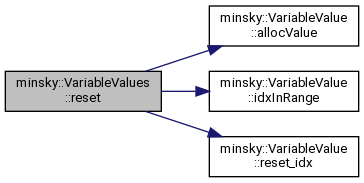#include <variableValues.h>


Public Member Functions | |
| VariableValues () | |
| void | clear () |
| std::string | newName (const std::string &name) const |
| generate a new valueId not otherwise in the system More... | |
| void | reset () |
| reset all variableValues to their initial conditions More... | |
| void | resetValue (VariableValue &) const |
| reset a give variable value to it's initial condition, in this context More... | |
| TensorVal | initValue (const VariableValue &, std::set< std::string > &visited) const |
| evaluates the initial value of a given variableValue in the context given by this. visited is used to check for circular definitions More... | |
| TensorVal | initValue (const VariableValue &v) const |
| std::vector< Summary > | summarise () const |
| bool | validEntries () const |
| checks that all entry names are valid More... | |
| void | resetUnitsCache () |
 Public Member Functions inherited from minsky::ConstMap< std::string, VariableValuePtr > Public Member Functions inherited from minsky::ConstMap< std::string, VariableValuePtr > | |
| ConstMap () | |
| ConstMap (const T &x) | |
| ConstMap (const T &x, const U &y) | |
| VariableValuePtr | operator[] (const std::string &k) const |
Private Member Functions | |
| CLASSDESC_ACCESS (VariableValues) | |
Static Private Member Functions | |
| static VariableValuePtr & | zero () |
| static VariableValuePtr & | one () |
Detailed Description
Definition at line 40 of file variableValues.h.
Constructor & Destructor Documentation
◆ VariableValues()
|
inline |
Definition at line 46 of file variableValues.h.
References clear().

Member Function Documentation
◆ CLASSDESC_ACCESS()
|
private |
◆ clear()
|
inline |
Definition at line 47 of file variableValues.h.
Referenced by VariableValues().


◆ initValue() [1/2]
| TensorVal minsky::VariableValues::initValue | ( | const VariableValue & | v, |
| std::set< std::string > & | visited | ||
| ) | const |
evaluates the initial value of a given variableValue in the context given by this. visited is used to check for circular definitions
Definition at line 252 of file variableValue.cc.
References minsky::FlowCoef::coef, minsky::VariableValue::init(), minsky::VariableValueData::m_scope, minsky::VariableValueData::name, minsky::VariableValueData::tensorInit, minsky::trimWS(), and minsky::valueId().
Referenced by minsky::VariableValue::init(), initValue(), MathDAG::latexInit(), and MathDAG::matlabInit().


◆ initValue() [2/2]
|
inline |
Definition at line 65 of file variableValues.h.
References initValue().

◆ newName()
| string minsky::VariableValues::newName | ( | const std::string & | name | ) | const |
generate a new valueId not otherwise in the system
Definition at line 355 of file variableValue.cc.
References minsky::valueId().
Referenced by minsky::IntOp::description().


◆ one()
|
staticprivate |
Definition at line 84 of file variableValue.cc.
Referenced by clear().

◆ reset()
| void minsky::VariableValues::reset | ( | ) |
reset all variableValues to their initial conditions
Definition at line 365 of file variableValue.cc.
References minsky::VariableValue::allocValue(), minsky::VariableValue::idxInRange(), and minsky::VariableValue::reset_idx().
Referenced by minsky::VariableBase::value().


◆ resetUnitsCache()
|
inline |
Definition at line 79 of file variableValues.h.
Referenced by minsky::VariableBase::units().

◆ resetValue()
| void minsky::VariableValues::resetValue | ( | VariableValue & | v | ) | const |
reset a give variable value to it's initial condition, in this context
Definition at line 328 of file variableValue.cc.
References minsky::VariableValue::allocValue(), minsky::cminsky(), minsky::Minsky::definingVar(), minsky::Minsky::dimensions, minsky::VariableValue::idx(), minsky::VariableValue::idxInRange(), minsky::VariableValue::isFlowVar(), minsky::VariableValueData::tensorInit, and minsky::VariableValue::valueId().
Referenced by MathDAG::ConstantDAG::addEvalOps(), and minsky::VariableBase::init().


◆ summarise()
|
inline |
Definition at line 70 of file variableValues.h.
◆ validEntries()
| bool minsky::VariableValues::validEntries | ( | ) | const |
checks that all entry names are valid
Definition at line 377 of file variableValue.cc.
References minsky::isValueId().

◆ zero()
|
staticprivate |
Definition at line 80 of file variableValue.cc.
Referenced by clear().

The documentation for this class was generated from the following files:
- engine/variableValues.h
- engine/variableValue.cc
